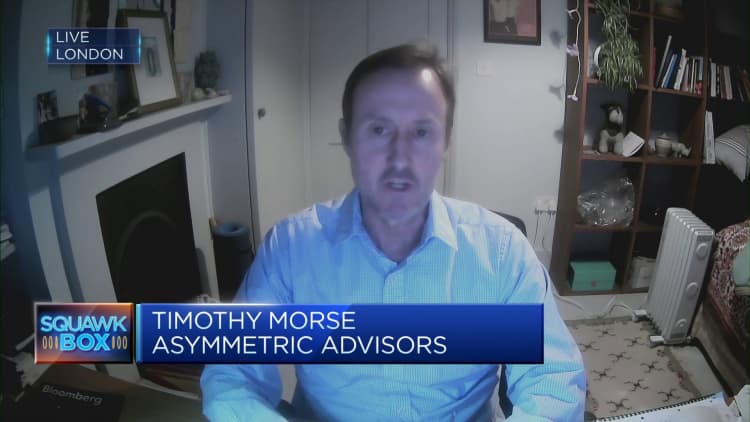Former subpostmasters celebrate outside the Royal Courts of Justice in London, on April 23, 2021, following a court ruling clearing subpostmasters of convictions for theft and false accounting. – Dozens of former subpostmasters, who were convicted of theft, fraud and false accounting because of the Post Office’s defective Horizon accounting system, have finally had their names cleared by the Court of Appeal. (Photo by Tolga Akmen / AFP) (Photo by TOLGA AKMEN/AFP via Getty Images)
Tolga Akmen | Afp | Getty Images
LONDON — Fujitsu‘s role in the U.K. Post Office scandal, dubbed the “most widespread miscarriage of justice” in British history, has analysts wary of what the fallout could look like for the Japanese IT giant.
Between 1999 and 2015, a fault with the company’s Horizon computer software used by the Post Office, a state-owned private company employing thousands of people across the country, resulted in more than 700 sub-postmasters being subjected to false prosecutions. Thousands more were driven to destitution, illness and in several cases, suicide.
The U.K.’s High Court ruled in 2019 that the Horizon software was at fault for the misreported losses at Post Office branches throughout the country, and a public inquiry was ordered by the government to take place in the following year.
However, the scandal has been re-ignited following the airing of a TV docudrama earlier this month, which showed that despite the acknowledgment, the sub-postmasters had never received adequate compensation for the financial and emotional damage inflicted.
The British government has introduced legislation to exonerate all convicted sub-postmasters and set aside £1 billion ($1.27 billion) in compensation for the victims, saying it will pursue Fujitsu if an ongoing inquiry finds the company is to blame.
Despite the furor in the U.K., Fujitsu shares are only down around 2% since the turn of the year, having suffered an initial drop after the company’s European co-CEO Paul Patterson said compensating Post Office victims was a “moral obligation,” before recovering over the past week.
Patterson later told U.K. lawmakers at the Business and Trade select committee on Friday that the company had “clearly let society down” and that there were “bugs errors and defects” with the Horizon software “from the very start.”
In a statement Thursday, Fujitsu said it regards the matter with the “utmost seriousness and offers its deepest apologies to the sub-postmasters and their families.”
“The U.K. statutory public Inquiry, to which our U.K. subsidiary is providing full cooperation, is examining complex events that have unfolded over many years, and we remain steadfast in our commitment to this cooperation,” the company said.
“Based on the findings of the Inquiry, we will also be working with the UK government on the appropriate actions, including contribution to compensation.”
Fallout could have ‘more negative consequences’ for Fujitsu
Tim Morse, founding partner of Asymmetric Advisors, told CNBC last week that while Fujitsu may not be on the hook for the entirety of the £1 billion compensation fund, it will have to shoulder a “reasonable financial burden,” and the company becoming persona non grata for future government contracts is “certainly a possibility.”
A spokesperson for Fujitsu wasn’t immediately available for comment when contacted by CNBC.
Members of Parliament on the Treasury select committee wrote to the government and other public sector institutions last week to demand that details of any contracts awarded to Fujitsu since 2019 be made public.
“The name of Fujitsu has been tainted, but don’t forget that Fujitsu — and previously to Fujitsu, ICL, which was very close to the U.K. government and was bought by Fujitsu in the early nineties — they’re very well embedded in U.K. government IT contracts, so actually replacing Fujitsu could be very expensive,” he told CNBC’s “Squawk Box Asia.”
He suggested the greater fear is that there could be further frailties identified in government-contracted programs, with issues already identified in Japan relating to ATM systems and national ID cards, along with an outage on the Tokyo Stock Exchange in 2020.
Mio Kato, founder of LightStream Research, told CNBC last week that he was surprised by the relatively “tepid” reaction in the stock price so far, because although the compensation payment may not be the “end of the world” for a company of Fujitsu’s size, the “reputational consequences could be more severe.”

“You do have these little issues cropping up attached to Fujitsu and while it’s impossible to completely iron out all bugs, the frequency is a bit of a concern considering that Fujitsu tends to supply their clients with really mission-critical software and systems,” he said, noting that the company may need to increase spending on quality control.
“So while this event may be quite U.K.-specific, what’s really concerning to us is the length of time over which it persisted, and the fact that even after certain evidence did seem to emerge suggesting that there were problems with their Horizon system, it wasn’t addressed in a timely manner.”
Kato suggested potential Fujitsu clients would have “significant concerns” about this aspect of the allegations.
“While this case hasn’t necessarily attracted massive attention outside of the U.K. yet, as it drags on, this could have more negative consequences for Fujitsu, so I’m still relatively cautious about the short- to medium-term outlook until we see exactly what the total fallout is,” he added.
If you are having suicidal thoughts, contact the Suicide & Crisis Lifeline in the U.S. at 988 or the Samaritans in the U.K. at 116 123.

